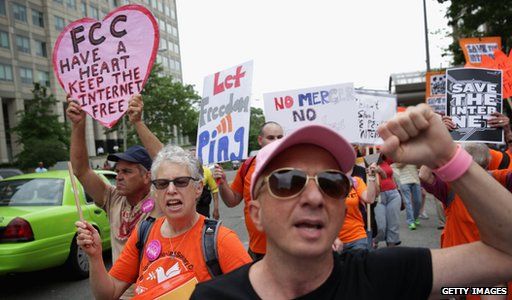FCC extends net neutrality comments deadline after glitch
- Published

A US regulator has extended a deadline for comments about controversial internet traffic rules after its systems struggled to cope with a deluge of messages.
The deadline was originally Tuesday.
But after the web-based submissions system became inaccessible, it has been extended to Friday.
The watchdog said it had received more than 780,000 comments about internet providers' right to charge other firms for "fast-lane" data delivery.
The Federal Communication Commission has promised that every message would be read.
It also plans to allow commentators to respond to each other's initial posts over a further period of 60 days running until 10 September before coming to a decision.
Tight vote
The FCC was prompted to re-examine the issue of "net neutrality" after a US Court of Appeals ruling in January.
The court sided with Verizon, a telecoms firm, that had challenged the regulator's earlier instruction that broadband providers must treat all traffic equally.
In May, the regulator's five commissioners voted 3-2 in favour of new language that states telecom providers must ensure "all users have access to an internet experience that is sufficiently robust, fast and effectively usable".
It adds that the term "users" includes both consumers and "content providers who do not enter into specific arrangements with broadband providers".
While the new rule would forbid net providers from blocking downloads of apps, websites and other legal content, it would still leave the door open to them to charge for "prioritised" data delivery.
For example, a broadband provider could charge Google to ensure its YouTube videos do not suffer buffering issues when downloaded at times of peak traffic.
The FCC did, however, ask people to comment about whether it should bar paid prioritisation outright, and how it might do that bearing in mind the earlier legal ruling.
Many net neutrality advocates have responded by calling on the FCC to reclassify broadband providers as "Title II telecommunications services" rather than their current status as "information services".
They say this would allow the watchdog to treat the firms as utilities, allowing it to block fast-lane deals.
"The time has come to start treating internet access as a standard telecommunication activity and regulate it like the telephone system," wrote one citizen, California-based David Ambrose.
"The technology is mature, and further delivery enhancements are only likely to come through a regulated monopoly."
But the telecoms industry has cast doubt over whether the FCC has the power to do this and has warned it would create an anti-innovation "government, may I?" culture.
"Further regulation of broadband providers' behaviour is not needed at this time and would threaten the healthy dynamics fuelling the growth and continued improvement of the internet and the many services it enables," wrote Verizon in its submission.
Missing posts?
A popular thread on the news service Reddit had initially suggested the FCC might have lost some of the posts because its comments counter only listed about 200,000 filings.
However, the watchdog has explained that the figure was misleading because of the different ways that people could send in their thoughts.
While the tally includes messages posted via its electronic filing system, many of the comments received via email have been lumped together into batches before being processed, it said, causing the number to appear low
In addition, the Daily Dot news site has reported that some organisations hand-delivered thousands of comments on Tuesday when the service went offline.
The FCC has pledged to scan and add these to its system.
- Published15 May 2014
- Published14 May 2014
- Published14 May 2014